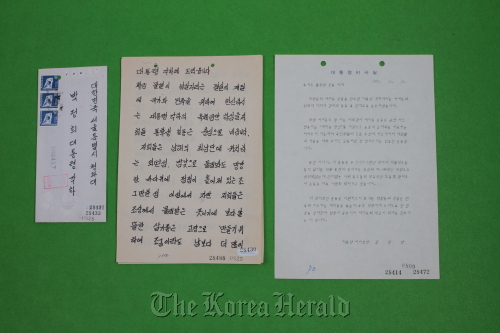Korea plans to apply for UNESCO’s “Memory of the World” designation for a vast amount of documents related to the “New Community (Saemaul) Movement,” the political initiative launched by the late President Park Chung-hee to modernize Korea’s rural economy, according to the Cultural Heritage Administration.
The state institution, which has been working on the application since last year, is submitting the application to UNESCO on Friday, Yi Kyung-hoon, director of the international division of the administration, said. Along with the “New Community Movement” documents, the organization is also filing a separate form for “Nanjung Ilgi,” the famous collection of war diaries by the 16th century admiral Yi Sun-sin.
The application results will be announced during UNESCO’s International Advisory Committee meeting slated to be held in May in Gwangju next year.

A letter (middle) written by a rural town citizen to the late President Park Chung-hee, and the reply (right) from Park’s secretary which explains the importance of the “New Community Movement.” (Korea Saemaul Undong Center)
“The Saemaul movement brought Korea’s rapid industrialization and is considered one of the most significant events in modern world history,” said Yi from the Cultural Heritage Administration.
“We thought the documents have enough historical and cultural value to be considered for the ‘Memory of the World’ status.”
The administration last year contacted the Korea Saemaul Undong Center, an NGO that archives various materials about Park’s political initiatives, and asked them to select the documents to be considered for the UNESCO designation.
“The documents selected include all kinds of government papers, photo albums, letters to President Park, money receipts and books that were written to educate rural citizens about the Saemaul movement,” said Choi Yong-geun from Korea Saemaul Undong Center.
“A lot of developing countries in Asia and Africa are trying to study the movement and try to launch its policies to modernize their rural economy. Because it provided such a positive example and hope for the world, we think it deserves to be listed as ‘Memory of the World.’”
Last year, two historical records of Korea were granted the UNESCO status: documents on the pro-democracy uprising in Gwangju in May 1980, and Ilseongrok, a diary-style chronicle of the daily lives of Joseon kings. The Gwangju uprising documents weren’t applied for the designation by the government; it was filed by a Gwangju-based NGO dedicated to getting UNESCO listing for the records.
Korea currently holds nine “Memory of the World” registers, including the original manuscript of the Korean writing system, “Hunminjeongeum,” and “Joseonwangjosilok,” or the Annals of the Joseon Dynasty.
By Claire Lee (dyc@heraldcorp.com)






![[KH Explains] Hyundai's full hybrid edge to pay off amid slow transition to pure EVs](http://res.heraldm.com/phpwas/restmb_idxmake.php?idx=645&simg=/content/image/2024/04/18/20240418050645_0.jpg&u=20240419100350)